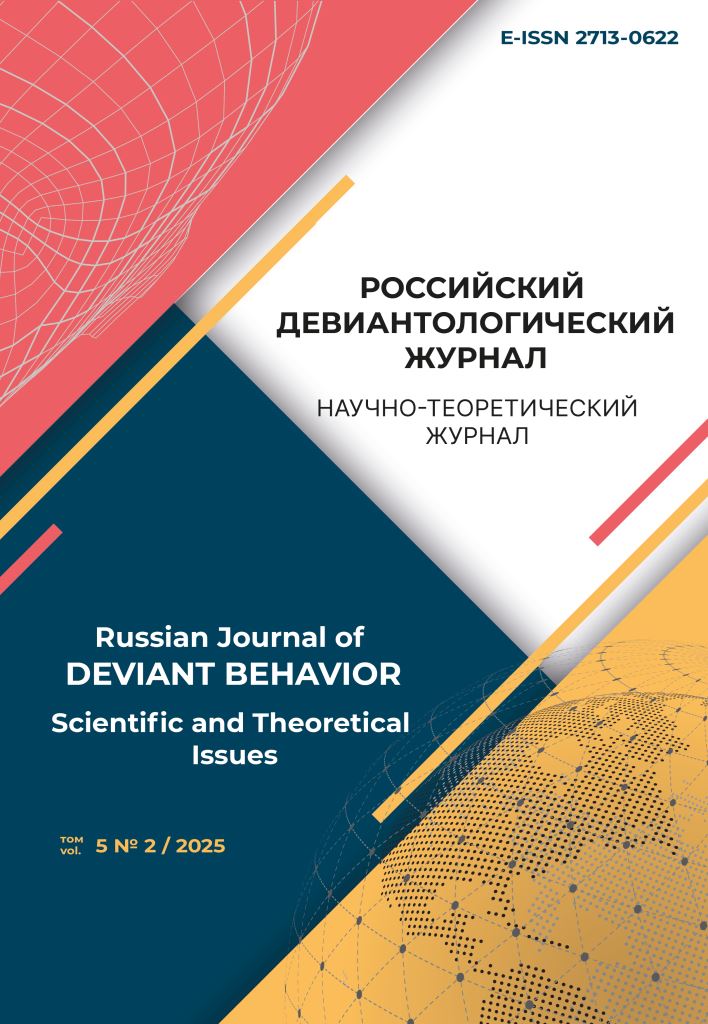employee
Sankt-Peterburg, Russian Federation
graduate student from 01.01.2022 to 01.01.2025
Saint Petersburg, St. Petersburg, Russian Federation
UDC 159.9.07
CSCSTI 15.41
Introduction. The research is aimed at studying the influence of negative early family experience on the formation of socio-psychological maladaptation in adolescence. The aim of the research is to identify the specifics of psycho-emotional reactions and behavioural patterns of adolescents having experienced emotional or physical violence in their families. Organisation of the research. The sample consisted of 52 adolescents aged 14 to 16 years (average age 15.2 ± 0.93 years) with destructive behaviour. The following methods were used: the questionnaire “Propensity for Deviant Behaviour” (A. N. Orel), the questionnaire “Family Experiences in Childhood Scale” (FECS), the Post Traumatic Symptoms Scale (PTSS-10), the essay “My Traumatic Experience”, and a diagnostic interview. Results. Aggressive tendencies were revealed in 84.6 % of the participants, while 76.9 % demonstrated a tendency to negativism. Adolescents from dysfunctional families showed higher indicators of mental instability (30.17 ± 12.65 points, p < 0.0001), including sleep disturbances, depression and emotional lability. The findings reflect the need to develop targeted psycho-correctional programmes for adolescents with dysfunctional family experiences.
social maladaptation, child-parent relations, adolescence, deviant behavior
1. Baeva, I. A., Ul'yanina, O. A., Vihristyuk, O. V., Gayazova i dr. (2022). Faktor social'no-psiholo-gicheskoj dezadaptacii i cennostnye orientacii podrostkov i molodezhi. Izvestiya Rossijskogo gosudarstvennogo pedagogicheskogo universiteta im. A. I. Gercena, 206, 228–242. https://doi.org/10.33910/1992-6464-2022-206-228-242
2. Venckute, M. S., Korneeva, Ya. A., Shahova, L. I. (2023). Harakteristiki social'no-psihologicheskoj dezadaptacii podrostkov, podvergshihsya psihologicheskomu, emocional'nomu i fizicheskomu nasiliyu. Psihologiya i psihotekhnika, (4), 1–25. https://doi.org/10.7256/2454-0722.2023.4.43594
3. Elisov, P. P. (2025). Analiz prichin uchastiya podrostkov v deyatel'nosti neformal'nyh molodezhnyh grupp. Mezhdunarodnyj nauchnyj vestnik, (1), 72–75. https://doi.org/10.24412/2782-3849-2025-1-72-7
4. Zashchirinskaya, O. V., Ogareva, E. I., Nikiforov, A. A. (2023). Trevozhnost' i kommunikativnye svojstva lichnosti. Pedagogicheskij IMIDZH, 17 (2 (59)), 170–181. https://doi.org/10.32343/2409- 5052-2023-17-2-170-181
5. Konishcheva, A. V. (2022). Podhody k issledovaniyu roditel'skogo otnosheniya v rossijskoj psihologii. Psihologiya i pravo, 12 (3), 88–96. https://doi.org/10.17759/psylaw.2022120308
6. Machurina, T. N. (2017). Tipy destruktivnogo roditel'skogo vospitaniya kak faktory razvitiya nevrotizacii lichnosti. Vestnik prakticheskoj psihologii obrazovaniya, 14 (2), 80–83. https://psyjournals.ru/journals/bppe/archive/2017_n2/Machurina
7. Molodcova, T. D. (2013). Osnovnye vidy i tipy podrostkovoj dezadaptacii. Koncept, 5 (21), 65–71. http://e-koncept.ru/2013/13099.htm
8. Omarova, P. R., Gitinova, M. M. (2025). Osobennosti viktimizacii nesovershennoletnih. Mezhdunarodnyj nauchnyj vestnik, (1), 58–62. https://doi.org/10.24412/2782-3849-2025-1-58-62
9. Pedchenko, V. V. (2017) Kriterii i pokazateli social'no-psihologicheskoj dezadaptacii starshego podrostka. Molodoj uchenyj, 5 (139), 405–410. https://moluch.ru/archive/139/39146
10. Semenova, K. G. (2024). Social'no-psihologicheskaya dezadaptaciya podrostkov: tipologiya i vzaimosvyaz' s sistemoj cennostnyh orientacij. Vestnik prakticheskoj psihologii obrazovaniya, 21 (1), 111–124. https://doi.org/10.17759/bppe.2024210109
11. Hlomov, K. D., Bochaver, A. A., Fomenko, M. S., Selivanova, E. I., SHemshurin, A. A. (2022). Agressiya i avtonomiya v podrostkovom vozraste. Psihologicheskaya nauka i obrazovanie, 27 (3), 117–128. https://doi.org/10.17759/pse.2022270309
12. Yurchenko, O. F. (2006). Diagnostika i korrekciya proyavlenij lichnostnoj izmenchivosti u podrostkov iz neblagopoluchnyh semej: dis. ... kand. psihol. nauk. Stavropol'.
13. Davies, P. T., & Cummings, E. M. (1994). Marital conflict and child adjustment: An emotional security hypothesis. Psychological Bulletin, 116 (3), 387–411. https://doi.org/10.1037/0033-2909.116.3.387
14. Frick, P. J., & Kemp, E. C. (2021). Conduct Disorders and Empathy Development. Annu. Rev. Clin. Psychol., 17, 391–416. https://doi.org/10.1146/annurev-clinpsy-081219-105809
15. Jhang, F-H. (2025). Coparenting conflict and externalizing problems among early adolescents: a longitudinal moderated mediation model. Curr Psychol, (44), 5003–5015. https://doi.org/10.1007/ s12144-025-07546-z
16. Hess, S. (2022). Effects of Inter-Parental Conflict on Children's Social Well-Being and the Mediation Role of Parenting Behavior. Applied Research Quality Life, 1(7), 2059–2085. https://doi.org/10.1007/s11482-021-10022-y
17. Krishnakumar, A., & Buehler, C. (2000). Interparental conflict and parenting Behaviors: A meta-analytic review. Family Relations, 49 (1), 25–44. https://doi.org/10.1111/j.1741-3729. 2000.00025.x
18. Singha, R., & Bhattacharjee, A. (2016). A Search of Different Maladjusted Behaviours of Adoles-cents Inside and Outside of Classroom and The Causal Factors That Are Responsible for Their Behaviours. International Journal of Research in Social Sciences, 6 (9), 435–444.













